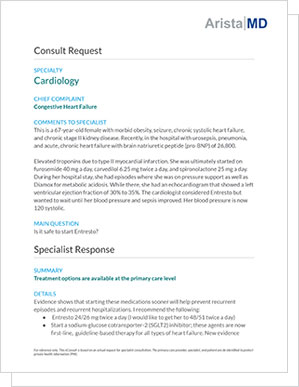SPECIALTY
Cardiology
CHIEF COMPLAINT
Congestive Heart Failure
COMMENTS TO SPECIALIST
This is a 67-year-old female with morbid obesity, seizure, chronic systolic heart failure, and chronic stage II kidney disease. Recently, in the hospital with urosepsis, pneumonia, and acute, chronic heart failure with brain natriuretic peptide (pro-BNP) of 26,800.
Elevated troponins due to type II myocardial infarction. She was ultimately started on furosemide 40 mg a day, carvedilol 6.25 mg twice a day, and spironolactone 25 mg a day. During her hospital stay, she had episodes where she was on pressure support as well as Diamox for metabolic acidosis. While there, she had an echocardiogram that showed a left ventricular ejection fraction of 30% to 35%. The cardiologist considered Entresto but wanted to wait until her blood pressure and sepsis improved. Her blood pressure is now 120 systolic.
MAIN QUESTION
Is it safe to start Entresto?
For reference only. This eConsult is based on an actual request for specialist consultation. The primary care provider, specialist, and patient are de-identified to protect private health information (PHI).
How Cardiology Consults Reduce Overuse of Emergency Departments

Many issues drive overuse of emergency departments (EDs) by low acuity patients. Diminished access to specialty care, long patient wait times for specialist visits and poor patient understanding of how to manage chronic conditions are a few examples. eConsults mitigate these disparities in care and access to specialists.
In many healthcare systems, hospital closures, practice consolidations, and a lack of access to specialty providers mean patients must travel far or wait a long time to receive care. This is true for conditions and complaints within a wide range of specialties in rural and urban communities. Without a specialist care plan in place, low acuity patients can end up in overtaxed emergency rooms for conditions that could’ve been managed by primary care doctors much closer to home.
Low-acuity patients can quickly access specialists within the primary care setting. eConsults enable primary care physicians to create and manage expedient care plans while reducing ER visits and improving care delivery.
eConsults help reduce overuse of emergency departments
eConsults help avoid ER visits and expensive specialty referrals because they allow the PCP to address issues before complications arise. Unlike informal curbside consultations, formal eConsult platforms, like AristaMD’s care coordination platform, streamline the physician referral process and improve patient outcomes.
The primary care team can ensure that follow-up care is properly managed by monitoring patient progress and coordinating care. This support helps prevent issues from escalating, reducing unnecessary ER visits. The ability to track patient goals and provide timely education further helps patients stay on top of their care and avoid complications that might otherwise require specialty intervention.
GET IN TOUCH
Ready to deliver lower-cost care without sacrificing quality?

